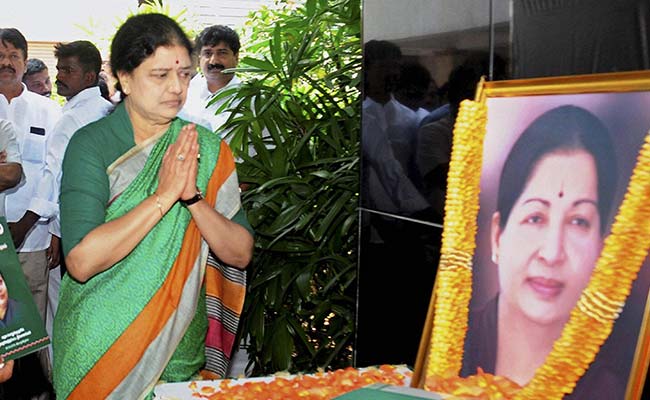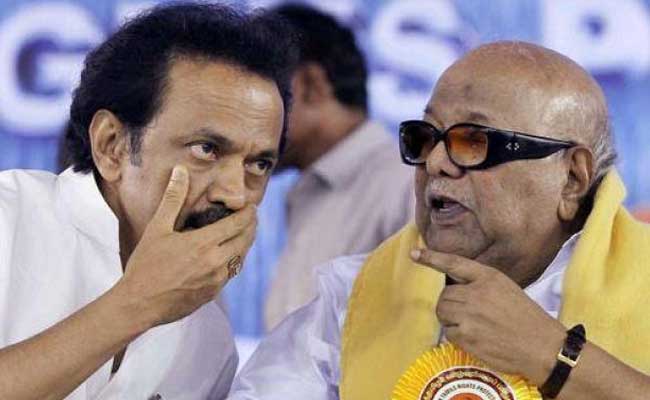Sasikala's excesses have caught up with her and the Supreme Court has effectively ended her independent political career before it even started. Before she starts to fade from public memory, E Palaniswami (EP) has taken the banner from her hands. Had this happened when Sasikala took over as the General Secretary of the party, the party might have faced the future united. But she initially chose to endorse the decision taken by Jayalalithaa that an AIADMK government should be led by O Panneerselvam (OPS) rather than the alternative senior leader available, EP; then, within days of the party making that unanimous decision, Sasikala snatched the position from OPS to install herself. The party split.
This is not a new experience for the AIADMK. When MGR passed away in December 1987, the allegiance of the majority of AIADMK legislators was clearly to his lawfully wedded wife, Janaki. Her supporters in and outside the legislature resorted to the most filthy language to denigrate the challenger, Jayalalithaa. Rajiv Gandhi, then Prime Minister, was approached and, in consultation with the Tamil Nadu Congress Committee leadership, decided that when it came to the floor test, the not inconsiderable number of Congress MLAs would support Janaki. But Janaki then made the mistake of directly approaching Congress MLAs to induce them, with the usual blandishments, to pledge their support separately to her. An infuriated Rajiv decided that if Janaki would not trust him to deliver, he could not trust her. The Congress would, therefore, abstain.

VK Sasikala has been found guilty of corruption by the Supreme Court and sentenced to four years in prison
Does that set the precedent for what is now to follow? Unless the hemorrhage from the EP camp to the OPS camp, or possibly the other way round, is stanched, the Janaki/Jayalalithaa divide is likely to be reflected in the EP/OPS divide. But once one or the other is sworn in as Chief Minister, there could be a narrowing. Such a projected narrowing presupposes the virtual isolation of the loser. However, unlike Janaki, neither contender is going to simply vacate the scene. Therefore, the fragmenting of the AIADMK will persist, with much hostility between the factions.
If, in the floor test in the assembly that must follow the swearing in of the new Chief Minister, the rump faction of the AIADMK votes against the Chief Minister to be sworn in, while the Opposition, as the Opposition, does its duty to oppose the AIADMK, whoever might be the AIADMK's Leader of the House, the government would fall and a period of President's Rule would follow. In the run-up to the next polls, to be held probably within this calendar year, the DMK would throw its all into profiting from this unexpected turn of events, and several of the smaller parties would be given the lip-smacking opportunity of being able to choose between the DMK and one of the two AIADMK factions. The only certainty is that the Congress and the BJP would not allow themselves to be in the same alliance. In any case, neither is capable of overtaking the main Dravidian parties.
Would the balance be tilted by Rajinikanth entering the fray? First, it is unlikely that Rajini would wish to leap into the midst of this swirling whirlpool of contradictions. Second, for reasons outlined in this space a few days ago, even if he did, his move is unlikely to be decisive. Certainly the faction or party he aligns with would get some electoral advantage, but not one that could be called decisive. When, in 1996, Rajini lent his full-throated support to the DMK-Tamil Maanila Congress alliance, he was supporting the side that would have won anyway, so disgusted were the people with Jayalalithaa's excesses that they defeated her even in her own assembly segment. It is those excesses that now stand proven by the tedious processes of our justice system delivering judgment all of 21 years after the electorate decided the charges were true.
As of today, the DMK is well ahead, because the AIADMK has lost its charismatic leader, while the leader of the rival party is still in the saddle, notwithstanding his frail health. In any case, 'Kalaignar' Karunanidhi has arranged a smooth succession. Stalin has been put in charge substantively even while the patriarch rules. There might be a challenge within the family as Alagiri is seething. But matters have been so arranged that an outbreak of internecine warfare in the DMK camp is not anticipated.

Last month, MK Stalin took over as "working president" of DMK. Father MK Karunanidhi, 92, stays chief.
The more haunting question is that of the law's delays. The charges in the Supreme Court against Jayalalithaa and her collaborators in crime relate to her first term as Chief Minister: 1991-96. It has taken 21 years for the judicial process to wind its way to a conclusion. Meanwhile, the first accused, Jayalalithaa, has had two full terms as Chief Minister and was into her third when she died. The Supreme Court now says, in effect, that a convicted criminal ran the state government for two full terms, won a third, and along the way, brought down a central government. The law's delays have thus impugned the credibility and integrity of our democracy. Either charges should be summarily dismissed or the judicial process made far more rapid. Else, mud-slinging will continue as the bane of our politics. What matters now is less the fate of the AIADMK - which appears, in any case, to have committed political suicide - than whether this case will provoke the authorities concerned to reconsider the entire process of justice - for, to reprise an old and much worn adage, justice delayed is justice denied.
(Mani Shankar Aiyar is former Congress MP, Lok Sabha and Rajya Sabha.)
Disclaimer: The opinions expressed within this article are the personal opinions of the author. The facts and opinions appearing in the article do not reflect the views of NDTV and NDTV does not assume any responsibility or liability for the same.


